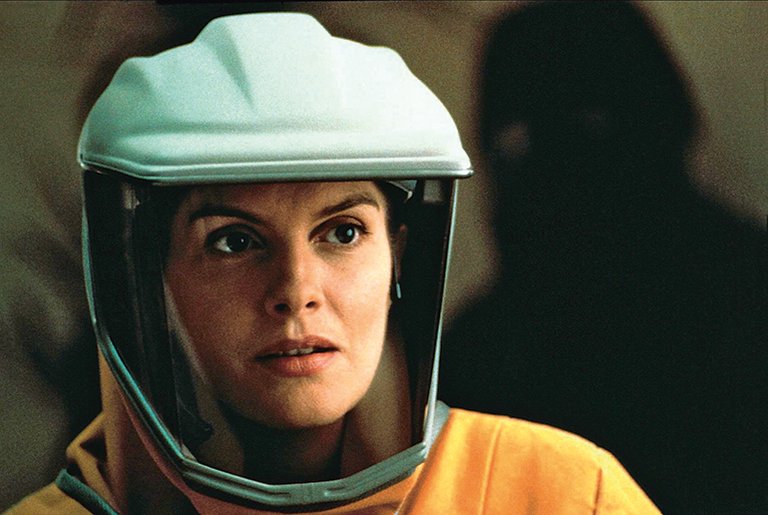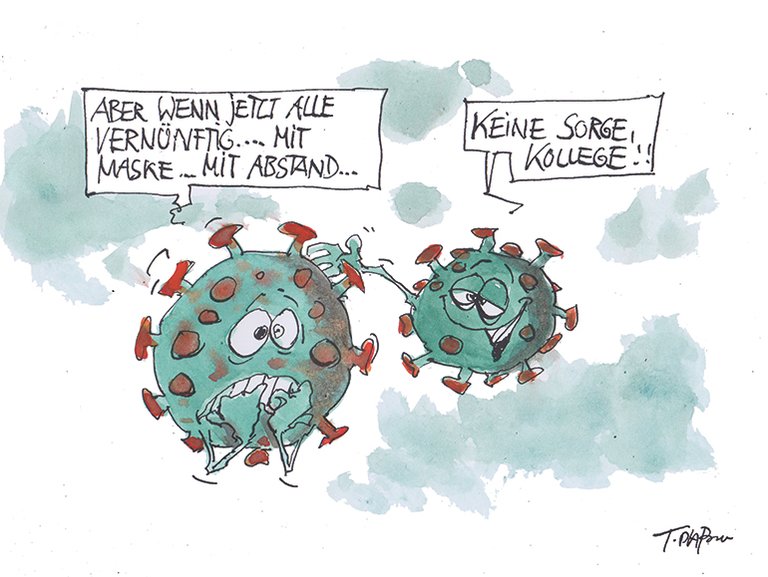The Dream of a New Beginning

Where do we go from here?
Die Stadt der Zukunft, or the city of the future, as envisaged by architect Friedrich von Borries and urban planner Benjamin Kasten in their book of the same name, will look very different from today’s hotchpotch of shopping streets and historical districts. Fairer, greener, and internationally networked within a politicised ‘globalopolis’. Urbanisation is inevitable – but urban areas need to be better designed, say the authors.
When their book on cities first appeared, with its utopias and its real-world examples, corona was unknown except as the name of a brand of beer. Now, as the third wave of the pandemic ravages Germany, it is clear that the virus has changed life in cities, and cities themselves, at a speed and to an extent that we could never previously have imagined, even if it was foretold in the Decameron and Albert Camus’ The Plague.

The numbers are stark: around 1.7 million people tested positive for coronavirus in Germany in 2020 alone. 30,000 died from or with Covid, and around 6 million people were put on state-funded furlough. The situation in Germany is actually better than in many other countries, but what makes the numbers all the more alarming is the fact that Germany seemed, during the first wave, to have everything under control. As German Chancellor Angela Merkel said in March 2020, this is the biggest challenge we have faced since the Second World War – including in financial terms. Germany has amassed an additional 2.2 billion euros of debt, and that mountain is still growing.
Matthias Horx, one of the foremost futurologists and trend researchers in the German-speaking world, is confident that our social experiences, more than anything else, will be a catalyst for change. ‘A crisis tends to teach us something about the systems that surround us, carry us and support us,’ says the author of Die Zukunft nach Corona. Wie eine Krise die Gesellschaft, unser Denken und unser Handeln verändert. He predicts that people will start questioning their old behaviour patterns and developing new concepts.
And we need those more than ever. Although the German healthcare system initially seemed well-equipped to handle the crisis, it is also struggling with deep-seated problems. People have been aware of these problems for years, but little has been done about them. Michael Steidl, who has worked as a nurse for over 20 years, and journalist Fabian Marcher address this issue in their book Weil es ohne uns nicht geht. They paint a vivid picture of the day-to-day running of an emergency department in a big hospital, and the impact of staff shortages, stress and overtime.

But the solution cannot simply be to employ more staff, argue heart surgeon Umes Arunagirinathan and co-author Doris Mendlewitsch in their book Der verlorene Patient. The problem goes far deeper than that. For a long time, the (internationally renowned) German healthcare system has not been prioritising patients and their successful treatment. Instead, the focus has been on efficiency gains. ‘The main concern is money, not people,’ says the surgeon, and this needs to change.
This sense of expectation, of hope that a new world may emerge from and as a result of the pandemic, is a theme that has been picked up by many authors. And that includes economic analysts – despite the huge amounts of debt currently being accrued.
Wie wir unsere Wirtschaft retten, or how to save our economy, is a question explored by one of Germany’s leading economists, Clemens Fuest, in his book of the same name. Fuest does not fall into the trap of offering conclusive answers or making definitive claims while we are still in the grip of the pandemic. He acknowledges that there are many unanswered questions. But there are also structural advantages in our handling of the pandemic that were lacking in our response to the financial crisis – such as the fact that EU Member States have managed, thus far, to work together rather than against each other. Even if, as we saw from the lengthy debates about the 750-billion-euro recovery package and the ordering of vaccines, it can take time.
The biggest challenge since WWII
At the same time, however, it’s clear that this crisis will not be the last, and that the frequency of such crises is increasing – be they pandemics, financial crashes or the impacts of climate change. This is putting democratic structures under pressure, particularly in Germany, where elections for the national parliament and various regional parliaments are due to take place this autumn. The government’s handling of the pandemic will be a touchstone in these election campaigns, as evidenced by the protests seen in the country in 2020. It will be hard to forget the way supporters of the ‘Querdenken’ movement, which opposes the German government’s coronavirus restrictions, forced their way into the Reichstag – especially after the storming of the Capitol by Trump supporters in Washington this January. Where do the wild conspiracy theories espoused by the Querdenken movement originate from, and how have they become so rife? How can democracy maintain the ability to defend itself, and at the same time modernise itself in order to keep pace with the mounting crises of today’s world?
Religious scholar and political scientist Michael Blume, who runs a prizewinning science blog, has been looking at the emergence of Verschwörungsmythen (conspiracy theories). Nobody is immune to such myths, he warns – as can be seen from numerous historical examples. He also looks at the way philosophers such as Hannah Arendt have approached this subject.
Crisis?
What crisis?
But simply educating and reining in the conspiracy theorists is not enough. Democracy needs to be proactive in other ways too, as Austrian political scientist Tamara Ehs explains in her essay Krisendemokratie. The digitalisation of democratic processes – from parliamentary procedures to employee participation in corporate decision-making – won’t simply disappear once the pandemic is over. What are the implications of this? As decisions with far-reaching consequences are made ever more quickly, how can we safeguard important conditions such as adequate transparency and citizen participation? Ehs also looks to neighbouring European countries in her search for a crisisproof democracy. Why not create a ‘Committee for the Future’ to serve as a think tank within parliament, as Finland has done?

